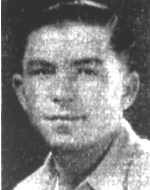Bornstein, Mordechai-David
Born in Leipzig, Germany, immigrated to Israel with his family in 1933. He continued his studies in Tel Aviv and excelled in his philosophy, especially in languages, and he knew Hebrew, German, English and later In the beginning of the Second World War, he followed in the footsteps of his father (who was a soldier in the First World War and volunteered during the Second World War to the British army, escaped and saved many of his comrades from German captivity, reached the rank of sergeant major, ), And when he was 15, he volunteered for the army, taking into consideration the special qualities that the recruitment officer found during his early years. And in the course of his spare time served as a “Class A Operator” and was transferred to the Bans Service, A (entertainment service for soldiers). When he was released at the end of the war, corporal and wearing six medals, he remained for a while as a salaried employee in the service of the British, as chief operator and director of a military movie theater. When he returned home, he worked for United Field Service as an operator, mechanic, plumber, driver, etc., and his success in the work assured him that he would be promoted and respected. Was a devoted son to his parents and family and a good friend and willing to help others. In December 1947, he came to the defense of the homeland and firmly opposed attempts to keep him in the rear because of family factors. He joined a Palmach unit in the Harel Brigade and took part in many battles on the way to Jerusalem (the Castel and more) and in Jerusalem and its environs, and he refused to accept a single day’s leave. Within the city and between Jerusalem and the settlements in the north. For the purpose of the operation, the Harel Brigade was transferred to Jerusalem and on April 22-23, its forces attacked Shuafat, Beit Iksa, and Nabi Samuel. The movement of forces to Nabi Samwil took a long time and the assault began at dawn. In the face of the enemy fire, the force was forced to withdraw and in the difficult retreat in broad daylight there were many casualties. In this battle he fell on the 14th of Nissan 5708 (April 23, 1948), and was put to rest at the military cemetery in Kiryat Anavim.
